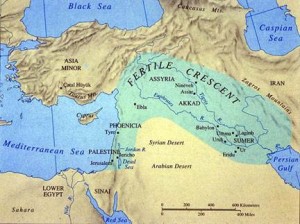War is not a sustainable part of any society. War has been a leading factor in the downfall of many civilizations. It’s a plague on humanity that seems inevitable in any modern society, and for the most part it is. Why? Agriculture is the culprit.
That’s a grossly oversimplified explanation, but one that does not need to be stretched very much to be justified. Agriculture brought with it sedentary lifestyle. Once the dispute for land and water began, the motives for warfare became unavoidable. The problem is that agriculture is just unsustainable. The most sustainable strategy for a peaceful civilization is that of a hunter-gatherer lifestyle. The practice of hunting and gathering left very little impact on the environment it took place in. Because of this, the environment in which it took place was able to provide sufficiently enough sustenance for the groups in that area, and when it was no longer a reliable food source the people would pick up and move to another location. The soil was left with little change and animals were hunted in reasonable numbers.
Most people nowadays would consider this to be the lifestyle of a lesser type of civilization with little value, due to contemporary American society revolving around a sedentary style of living. However, it was these very types of societies that were able to outlive Mesopotamia by hundreds of years. Mesopotamia has been nicknamed the Cradle of Civilization and is often times praised for its innovative and intelligent system for irrigation that it developed. This system had fatal flaws though, in that it caused salt to accumulate in the soil and continuously slowed the quality and quantity of crops that could be harvested each season. It goes to show that even one of the most prominent of previous civilizations was not immune to the unsustainable nature of sedentary life.
It’s difficult to pinpoint the exact time which warfare became more of a norm among societies, but it seems to have become common practice about 5,000 years ago when states began to emerge. States emerge with the development of political units, which are in turn developed as sedentary life and agriculture is established. With the creation of agriculture, there has to be someone in charge, in order to oversee the cultivation and this leads to the village caring for this figure and providing tribute. This trend continues as more political figures are created.
Warfare is not a common practice for hunter-gatherers. They are able to live a peaceful existence because there is little rivalry or even interaction among foreign groups. Without a sedentary life or a political hierarchy caused by agriculture the motivation of “status” for citizens disappears, lessening internal conflicts. Territorial disputes also disappear, for nomadic groups acknowledge that they hold no claim to land. It seems that the more that the past gatherer lifestyle is compared alongside contemporary modern societies, the more the former feels like the most rational option. Reverting back to more more sustainable style would involve changing the lives that we’re accustomed to, and for many that’s a process near impossible.
– Bernardo
image 1: https://encrypted-tbn0.gstatic.com/images?q=tbn:ANd9GcR3JmC4-jLmrrRiTWb_WWPgMIgqYKJG7TrzrVjs_EUZLtxoIK211A
image 2: http://mrkash.com/images/mesopotamia.jpg



Hunter-gatherer societies are often held up as paragons of sustainability. While they are certainly more resilient in the face disasters (and less prone to creating their own) than modern American society, it is important to note that some elements of a hunter-gatherer lifestyle may not be practical to implement nowadays. In Surviving Sudden Environmental Change (2012), Ben Fitzhugh examines the fragility of the hunter-gatherer societies on the Kuril Islands in the face of modernity. Fitzhugh notes, “The occupants of the Kuril Islands were surprisingly resilient to natural events…but less resilient ultimately to outside pressures from competing groups and expanding demand for Kuril commodities.” (36) While the semi-nomadic hunter-gatherer subsistence pattern of the Kuril islanders seems well adapted to environmental change, they were ultimately too economically dependent on the Japanese archipelago and Russia, and were therefore unable to repel Sino-Japanese colonialist expansion. The question is not only why hunter-gatherer groups were more peaceful or resilient than our present-day society, but what aspects of their culture can we practically integrate into a modern-day, capitalist nation?
I agree, i don’t believe necessarily that in this day and age that a hunter-gather regression may be the best path, due to the limitations that such a society would have and disadvantages compared to the sedentary societies around them. The fragility of hunter-gatherer societies is not so much due to their own inability to come together and build a peaceful and sustainable community. Instead it is the modernization of American culture and other cultures that does not allow for even the integration of a hunter-gatherer lifestyle into contemporary civilizations. Your own example of the demise of hunter-gatherer societies provides a good point of reference, for it is entirely possible that although the hunter-gatherer societies of the Kuril islands were dependent entirely on their environment, they might have thrived if left undisturbed. Nonetheless, it’s correct in saying that a sedentary lifestyle is a much easier one to adopt in society today.